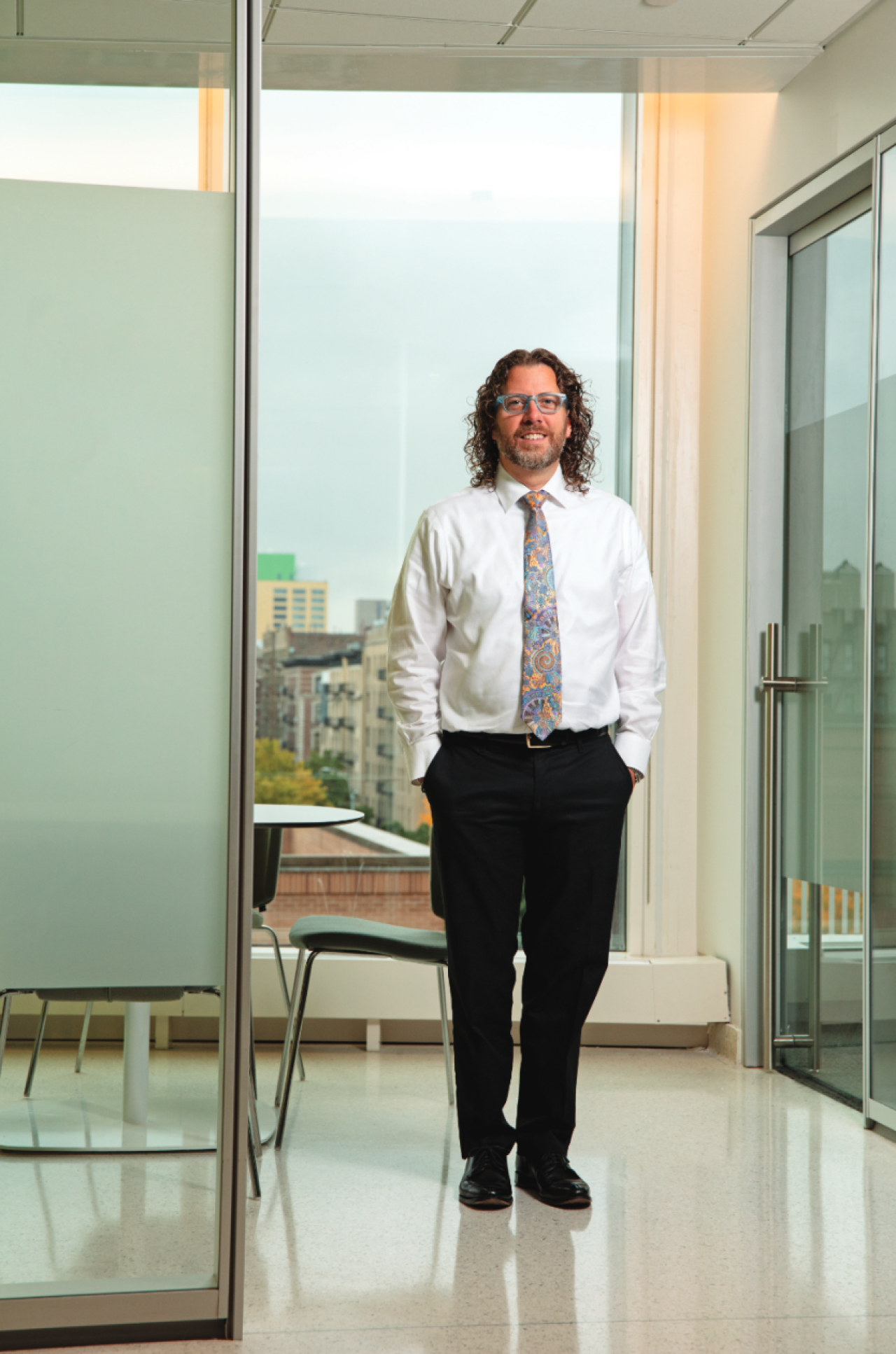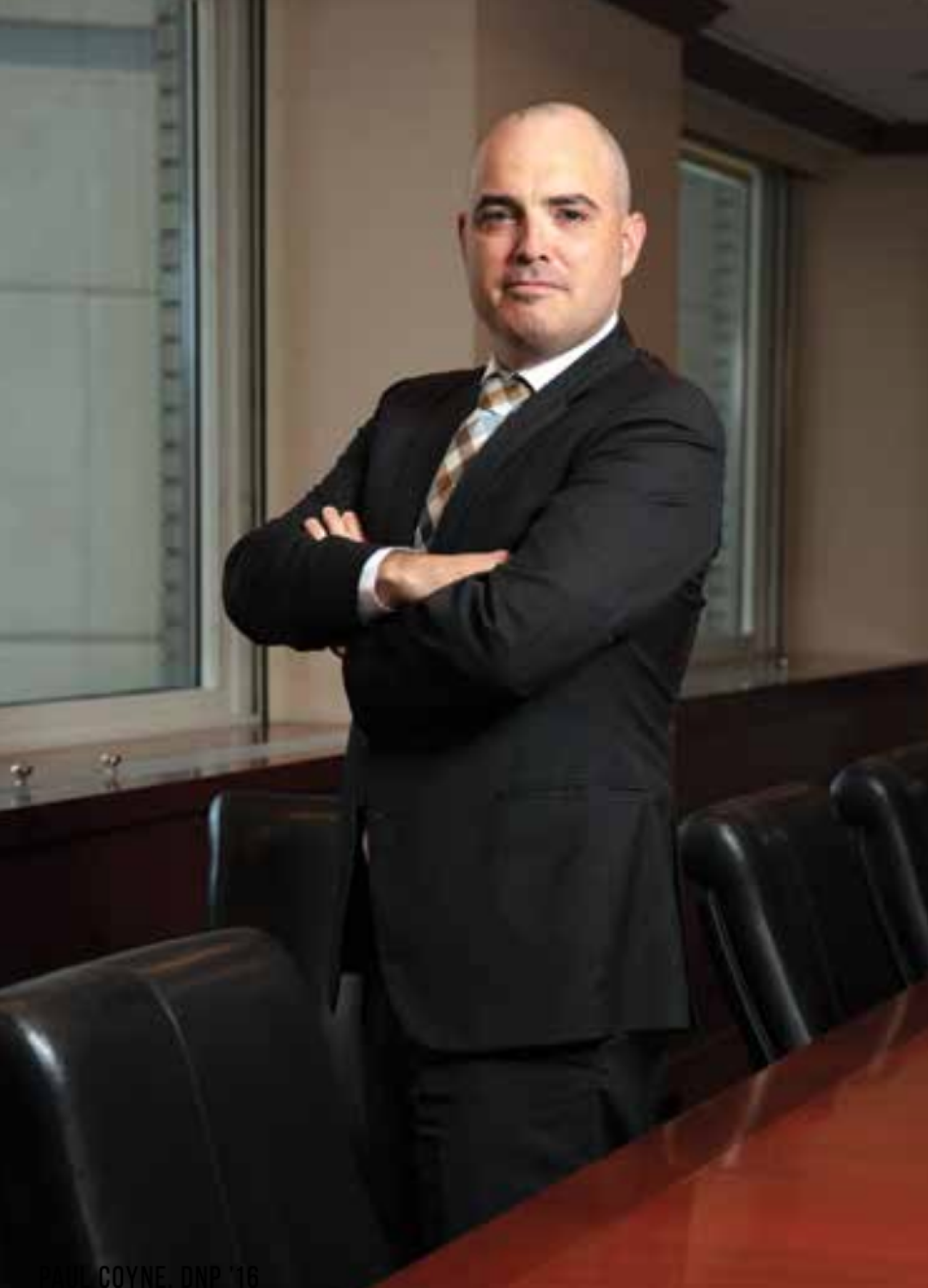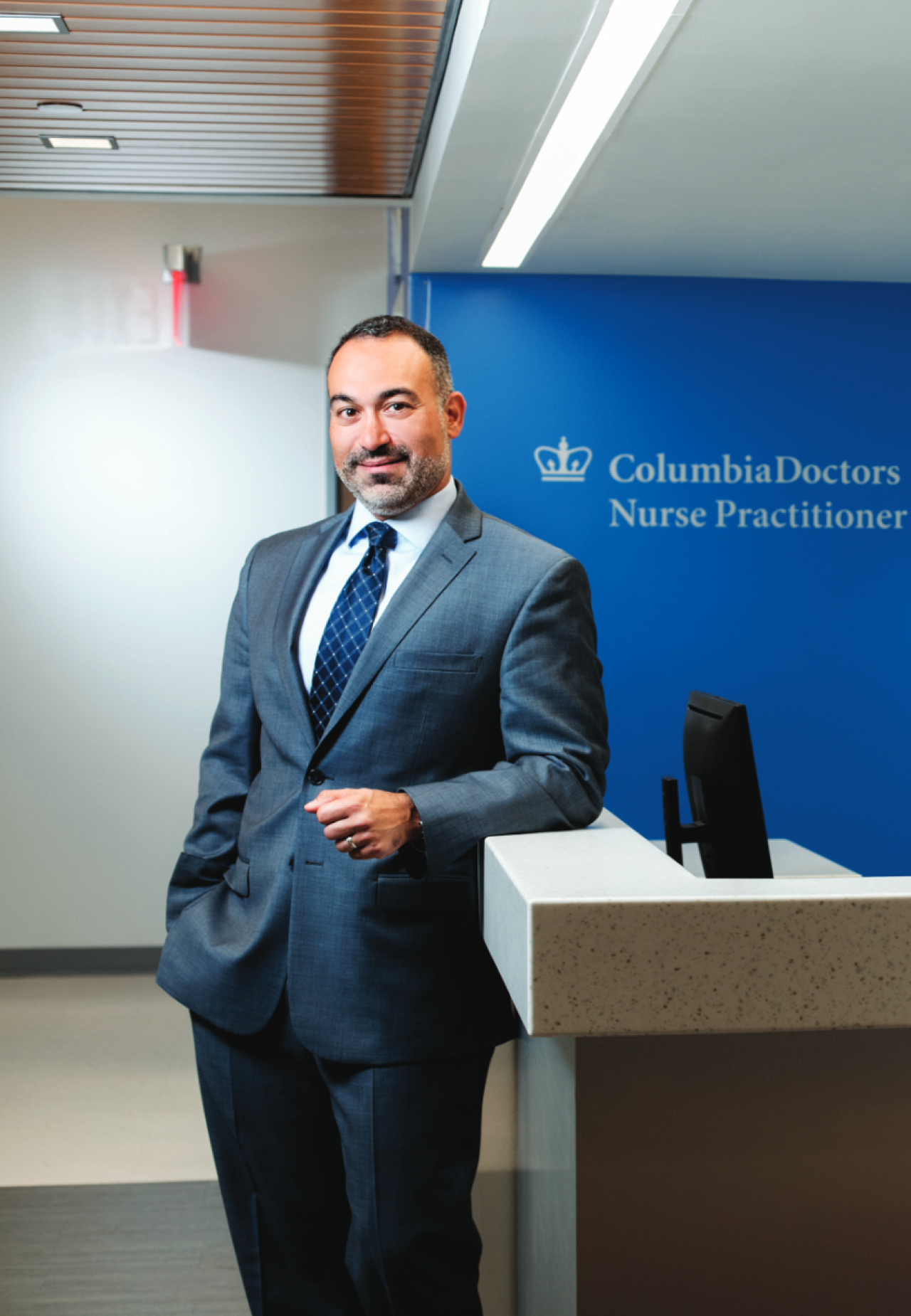"Hello, doctor." That's how patients commonly greet Daniel Billings, DNP '18, an infectious disease nurse practitioner at Memorial Sloan Kettering Cancer Center in Manhattan. He earned his bachelor's and master's, as well as his DNP, from Columbia Nursing. But though he does hold a doctorate, Billings knows what these patients are thinking: "As soon as I enter a room," he says, "people assume I'm the physician."
Paul Coyne, DNP '16, who also holds BS and MS degrees from Columbia Nursing, is senior vice president and chief nurse executive at the Hospital for Special Surgery (HSS), also in Manhattan. He encounters similar assumptions. "People ask, 'Why didn't you want to be a doctor?'" Coyne says. "They don't realize that I am a doctor." And, he adds, "Why don't they ask my wife, who's also a nurse, that question? Do they ask their doctor why she didn't want to be a nurse?"

Such gender-based stereotypes about who is-or should be-a nurse are all too common in the United States, where nearly 9 in 10 nurses are women. But the tenfold increase in the number of men in the field over the past 40 years, from 27,000 in 1977 to 310,000 in 2018, is gradually challenging these stereotypes. Today, the proportion of registered nurses who are male is at an all-time high of 12%, up from less than 3% in 1970. This has changed perceptions and definitions in what, along with teaching, was once considered a "women's profession." (The social science literature is replete with journal articles on that unfortunate, long-held assumption.)
The influx of men into nursing reflects many trends. Some are specific to nursing, including high turnover in the field and waves of retirements, which have depleted the nursing workforce and overburdened the health care system. Cyclical economic slumps have played a role, too. There has also been an increased desire among men for work that is wellpaying, but also intellectually and emotionally satisfying, and that offers professional autonomy, growth, and flexibility-all characteristics of a career in nursing. Another trend that has affected the gender balance in nursing is a
growing awareness that diversity-including gender diversity-in health care enhances both the caregiver and the patient experience.
The need for nurses
According to the U.S. Bureau of Labor Statistics, there are some 3.9 million registered nurses in the U.S., approximately
a million of whom are older than 50 and thus likely to retire in the next 10 to 15 years. Between impending retirements, the loss of nurses to COVID-related burnout, an aging population, and an increase in chronic illnesses, the need for nurses is higher than ever. In fact, employment opportunities for nurses are predicted to grow faster than those in any other occupation between 2016 and 2026.

Columbia Nursing, long known for its leadership in diversity in both clinical nursing and nursing education, recognized these trends decades ago. The school enrolled its first two men over 50 years ago-Ramón Lavandero, BS '72, MS (also one of the school's first Latino students), and John Mladinich, BS '72. Today, the student body of Columbia Nursing's degree-granting programs is 14.1% male, compared to 12.4% in 2017, says Naveed Ahmad, director of student life. The applicant pool for the school's Masters Direct Entry (MDE) program was 13.4% male in 2022, compared to 11.7% in 2012 for the program's precursor, Entry-to-Practice (ETP). Those upturns, says Ahmad, are "a sign of men's increasing interest in the field." To meet this interest, and the need for more nurses, the school recently relaunched the Columbia Men in Nursing group, which was originally formed in 2015 to encourage men to join the field. The group, which now aims to become a nationally recognized chapter of the American Association for Men in Nursing, has expanded its mission to support personal and professional development for students, alumni, and faculty of all ages; to address men's health issues; and to explore their unique contributions to the profession and the school, says the group's leader and advisor, Don Boyd, PhD '17, an assistant professor of nursing.
"Men are recognizing that nursing's not a dead-end job," says Boyd, a certified registered nurse anesthetist and the associate director of the school's Nurse Anesthesia Program. Boyd became a registered nurse in 1995, at a time when it was considered an uncommon career choice for men. "When I told someone that I was in nursing school, they would say, 'Oh, you're becoming a male nurse,'" he recalls. "No one ever said, 'I'm going to be a female nurse.' You had to start tearing down barriers any time you talked about it."
Nursing is a great career," Paul Coyne says. "You can do so many things-from working at the bedside to ... owning your own business. It's just a good job."
Boyd says he himself didn't encounter barriers in the field, probably because his first nursing job was at a veterans' hospital, where most of his patients were men who were accustomed to receiving care from male medics. He also found easy acceptance among patients during his eight years working on a pediatric intensive care unit. "Kids are open-minded," he says.
A career with many options
Passionate about clinical work, Boyd envisioned dedicating his entire career to direct caregiving. But the more he learned about the profession, the more he saw that nursing was not limited to bedside care, and the more interested he grew in the many opportunities the field offered. "There are nurses everywhere, throughout all industries, including business, research, and pharmaceutical development and sales, and they're all doing amazing work," he says. "Nursing is almost anything you can wrap your mind around doing professionally, including becoming a CEO of a highend company. In nursing, you have the ability to recreate yourself within the profession."
The chance to recreate himself is exactly what drew Coyne to nursing after recovering from a thalamic stroke that he suffered at age 22, while working as a financial analyst at Goldman Sachs. "As my brain came back," he says, "I wanted to see what parts of me were missing and what new parts I could find." In addition, he wanted to demonstrate his gratitude to the nurses who had painstakingly restored his health. The best way to do that, he decided, was to become a nurse so that he, too, could deliver compassionate, even lifesaving, care. "Nursing was something inside that was calling me," says Coyne, who is now an adult-gerontology nurse practitioner. "In nursing, you work hard and can have the joy of knowing that you made a difference in someone's life," he observes.

Married and the father of a three-year-old son, Coyne says nursing gives him the flexibility to share childcare responsibility with his wife (and Columbia Nursing classmate), Danialle Calaustro Coyne, MS '15, while providing him with a path to his current leadership post at HSS. "To those who say that a man's role is to provide for his family, I say that nursing is a great career, with a starting salary that is on par with those in some areas of Wall Street," Coyne says. "In nursing, you can do so many things-from working at the bedside to being a legal nurse-consultant to owning your own business. It's just a good job."
Giving back
The desire to make a difference in people's lives-especially at life's end-is what led Billings, a former opera singer, to his nursing career. He found his initial inspiration while helping to care for a friend battling non-Hodgkin lymphoma. Observing and supporting his friend's nursing care; providing respite care for his friend's mother; and hearing his wife, who is a registered nurse, talk about her work experiences, moved him to leave his professional singing career so he could dedicate himself to helping others. "I've been the recipient of so much good, and I didn't feel I was giving back to the world in the way I felt I needed to," Billings says. "Nursing gave me that opportunity."
Billings spent his early nursing years in Washington Heights, caring for patients with sickle cell disease at New York-Presbyterian Hospital. He soon realized that nursing entails more than hospital care. By teaching patients how to take care of themselves at home and in the community and how to manage their diets and medications, he began to appreciate that he was able to make a real difference in their lives. "I saw myself in a lot of my patients," says Billings, who is Black and grew up in a low-income, single-parent household in Harlem. "Nursing isn't just about treating patients in a hospital but helping them to live healthier lives," he says. "By helping my patients, I feel that I'm giving back."
Many-and equal-opportunities
Giving patients the information and compassion they need to take care of themselves is at the heart of excellent nursing care, says Stephen Ferrara, DNP, Columbia Nursing's associate dean for clinical affairs. "One of the most important things that providers can do for patients is to be close to them and to break down information so there's no jargon. That's what nurses do," explains Ferrara, who was just elected president of the American Association of Nurse Practitioners (AANP), the largest professional membership organization for nurse practitioners. Although he acknowledges that women still predominate in the field, Ferrara considers it "an equal opportunity profession" that should look like the population it serves by having greater male representation. This is particularly important for patients who may feel more comfortable discussing male-specific health issues with nurses who are male, according to Ferrara. "We need to always think in terms of patient care." For example, some men may prefer having a nurse who is also a man when it comes to discussing prostate cancer, sexual dysfunction, or genitourinary conditions often associated with sexually transmitted infections, says DNP student Jaspreet Wadhwa, who is planning to be a family nurse practitioner. "Certain men may feel more comfortable talking about such sensitive and personal topics with a nurse who is also a man because there may be a greater level of understanding," Wadhwa says.
Lingering stereotypes
Despite the rising number of men in the field, stereotypes remain, especially in some cultures that continue to regard nursing as a women's profession, says Wadhwa, past president of the Columbia Men in Nursing group. "A lot of men in nursing, especially those of color, can relate to that sentiment," he says.

To get around this stigma, men sometimes choose to work in emergency rooms or on critical care units, areas that Ferrara says are traditionally designated as "testosterone fields," because they typically require intense, physical interventions. "We've seen nurses who had primary careers as firefighters or police officers end up in the ER or ICU," he says.
By limiting themselves to these highly physical forms of nursing, however, men "skim the surface of what nurses can do and where they're needed," Ferrara notes. "We're starting to move beyond that," he says. "We're seeing a shift now with people entering nursing as a primary career with a heightened awareness of how stable it is and all the different opportunities it offers," he says. "If I was counseling any college student, I'd say, 'Nursing is a career that offers lots of opportunity. It pays well, doesn't lock you into one particular area, and gives you potential for growth.'"
Jesus Casida, PhD, who received his MS from Columbia Nursing in 1996, is a perfect example. Casida started his career in 1990 as a cardiac surgery ICU staff nurse and steadily discovered his passion for leadership, first in nursing practice and eventually in academia, science, and administration. "Cardiac surgery nurses have a lot of autonomy at the bedside and can use their advanced skills for complex decision-making," he says. "When I saw how nurses could use these skills to help patients recover from major cardiac surgery, I realized the invaluable role of nursing and seized the opportunity to take on leadership roles," says Casida, who is now the Billingsley Professor of Nursing and executive director of the Eleanor Mann School of Nursing at the University of Arkansas. "Nursing is a great profession," Casida says, "and the opportunities are limitless. It is up to the individual to leverage what the profession can offer."
Jesus Casida says that being male never dampened his fervor about nursing. "The essence of nursing is kindness and caring for other people," he says.
Casida, who is also a new board member of Columbia Nursing's Alumni Association, says that being male never dampened his fervor about nursing or influenced any of his professional choices along the way. "The essence of nursing is kindness and caring for other people," he says. "If someone has those inherent values, then they will do very well in nursing. It doesn't matter if you work at the bedside or in academia. If you don't have basic caring and humanistic skills, then this profession is not for you."
More options, more diversity
But the old fallacy that nursing is not for men has long been debunked. "Over the years, things have changed in terms of how men are viewed in the profession," says Columbia Nursing's Ahmad. "The stereotypes attached to nursing are dwindling, so that however you identify, there's a place for you." As the field continues to welcome more men, it is also opening doors for other populations historically underrepresented in nursing, including BIPOC (Black, Indigenous, and people of color) individuals. "As nursing advances," says Wadhwa, "it is becoming more inclusive and welcoming. As men, we understand that we are in a field where we're not the majority or even equal in numbers, and we also understand that the best model of health care is having a diverse group of nurses, since we all bring something different to the table." Conveying this message is a top priority for Columbia Nursing, including through its reactivation of the Men in Nursing group. However, Ferrara stresses, the group is not just for men. "Columbia Nursing is known as a school that welcomes everyone from everywhere," he says. "Our goal is to bring people together and share a diversity of conversations, opportunities, and experiences. We want to see more male students, but we don't want to have a solely male perspective. We welcome all genders and all races because we want to reflect the increasing diversity in nursing. That, for me, is the most important thing that I want to see come out of this group."
As for Coyne, he'd like all stereotypes of who is or should be a nurse to end. "More people in the nursing profession, regardless of gender, make health care better," he says. "I want the stereotype of nursing as woman's work to be gone so we can all be nurses. We're all human beings who care."






